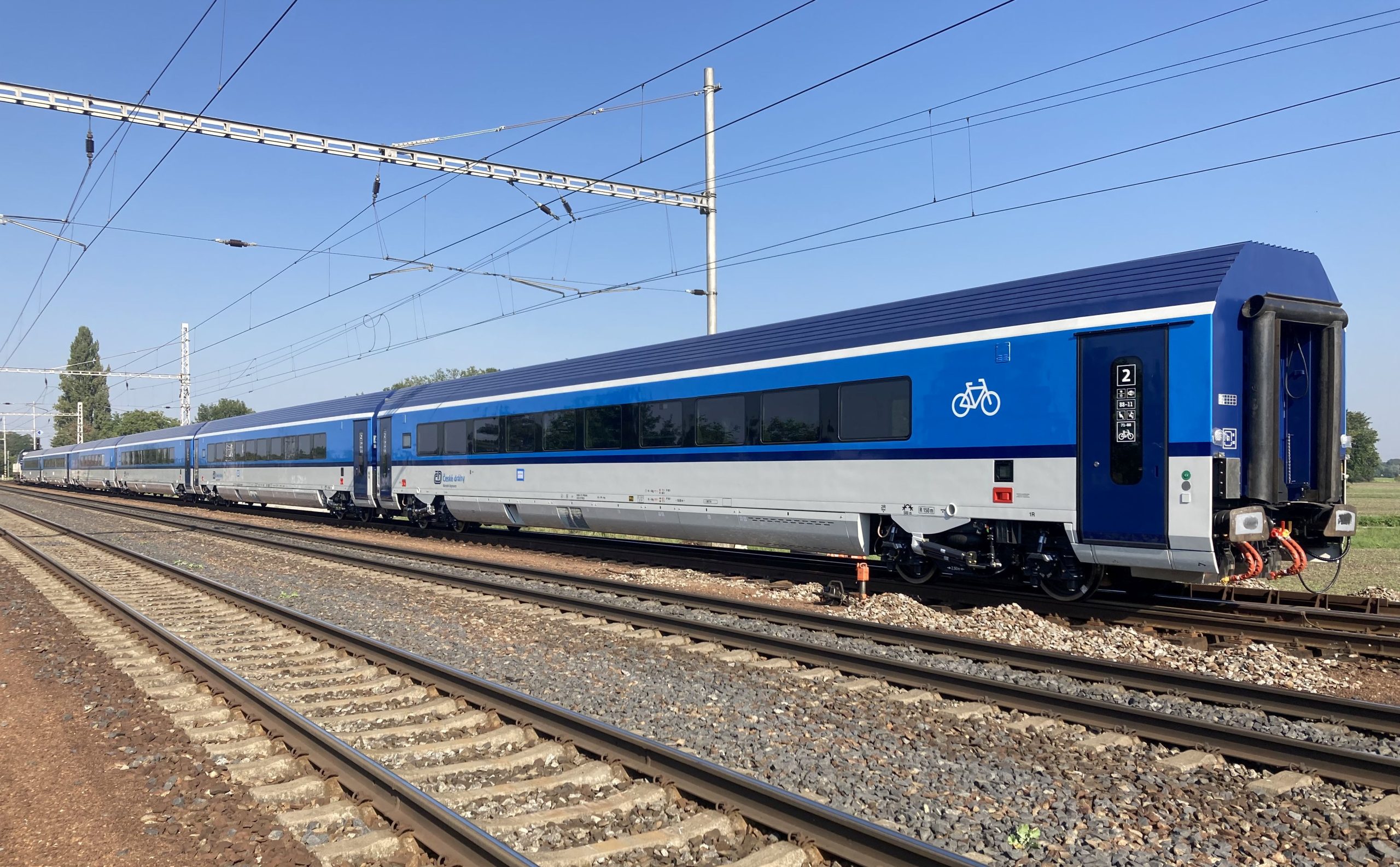 The first six of 180 ComfortJet carriages for České dráhy have arrived at the VUZ Test Centre in Velim in Ostrava to enter testing and approval procedures. The Siemens Mobility – Škoda Group consortium which is supplying the new rolling stock must obtain approval for regular operation on the Czech and European railway lines. In the next weeks, the new vehicles “will undergo various examinations and tests necessary for the approval of the vehicles in the seven European countries in which their operation is planned,” Roman Kokšal, CEO of Siemens Mobility in the Czech Republic said.
The first six of 180 ComfortJet carriages for České dráhy have arrived at the VUZ Test Centre in Velim in Ostrava to enter testing and approval procedures. The Siemens Mobility – Škoda Group consortium which is supplying the new rolling stock must obtain approval for regular operation on the Czech and European railway lines. In the next weeks, the new vehicles “will undergo various examinations and tests necessary for the approval of the vehicles in the seven European countries in which their operation is planned,” Roman Kokšal, CEO of Siemens Mobility in the Czech Republic said.
The ComfortJet carriages will be put into operation between 2024 and 2026 on international routes from Prague to Hamburg, Graz and Budapest, among others.
“The start of trials of the new ComfortJet carriages on the test railway circuit near Velim moves the project forward by another important step, without which it is impossible to put the brand new rolling stock into operation. It is now up to our suppliers and their partners to complete the tests in the planned schedule and quality and to get the units approved for regular operation in time,” Michal Krapinec, the Chairman of the Board and CEO of Czech Railways said.
“We expect the first unit to be put into operation during the first quarter of next year. The exact date will depend on Siemens and Škoda, which must test and approve the trains at the railway authorities,” said Jiří Ješeta, the member of the Board of Directors of ČD and deputy general director of ČD for passenger transport division.
The units will enter trial operation on the connection between Prague and Ostrava and extended to Berlin, thus ensuring a comfortable journey from Prague to Berlin, Jiří Ješeta explained. This will follow the testing of restaurant and control cars which will be added to the new carriages and by 2026 the new rolling stock will enter full operation in push-pull mode, driven by Vectron locomotives from Siemens mobility. The trains will serve the routes to “Germany, but also to Austria, Slovakia, and Hungary, and we want to succeed with by deploying them also on trains to Denmark,” Jiří Ješeta mentioned.
The ComfortJet carriages are designed to be able to operate at a speed of 230 km/h including on the Berlin – Hamburg route, as well as on the other new lines, such as the Koralmbahn in Austria or the planned high-speed lines in the Czech Republic.
In April 2021, České dráhy and the consortium of Siemens Mobility and Škoda Group signed a EUR 500 million contract for the supply of 20 Viaggio Comfort nine-car non-traction units including control cars. The push-pull trains have a control car on one side and will be guided by a Vectron locomotive on the opposite side. This facilitates turn-arounds of the trainset at destination stations, as no change of locomotive is required.
The new vehicles are manufactured at the plants in Vienna, Munich and in Ostrava there are currently 10 railcars in various stages of development. Some of them are undergoing electrical systems and static tests and for other the final assembly will start soon, Tomáš Ignačák, the President of Škoda Group in the Czech Republic and Slovakia region explained.
České dráhy is investing to renew its rolling stock to replace the existing old vehicles and to provide modern and comfortable journeys in order to increase passenger ridership and to increase the attractiveness of rail passenger services.
At the beginning of this year, the Czech national rail operator has launched a tender procedure to acquire 47 dual-voltage electric multiple units for regional services, a contract that will include the provision of spare parts and complete maintenance services for 15 years. EUR 354 million is the value of the contract.
Another step to renew its rolling stock was taken in November 2022 when České dráhy launched two tenders for up to 150 dual-voltage EMUs which will be used for long distance and suburban services. EUR 1.7 billion is the estimated value of both framework agreements. The first one includes the delivery of up to 90 90 EMUs for suburban traffic, while under the second contract the winner will supply up to 60 EMUs and their spare parts and ensure the maintenance services.
ČD’s plan to develop its fleet also includes a EUR 114.4 million framework contract signed with Pesa Bydgoszcz for 160 two-car DMUs with a firm order for 33 trainsets.
In addition, Škoda Group will provide maintenance services for the RegioPanter and InterPanter fleet until 2025 under a EUR 39 million contract.
Share on:



